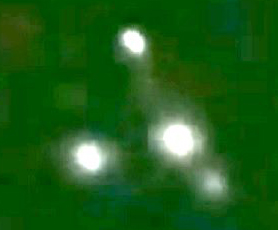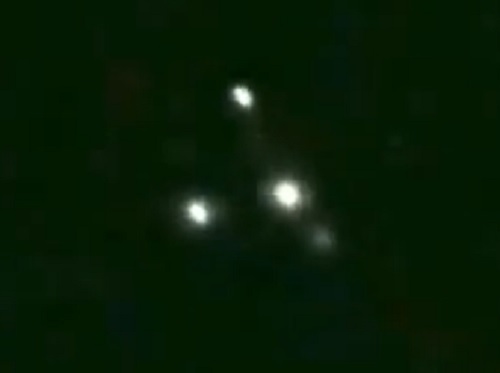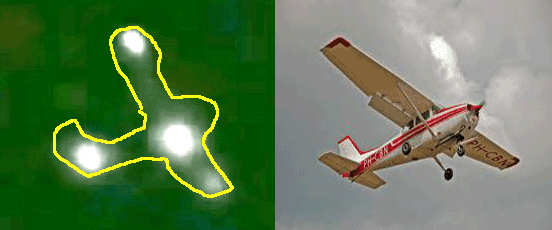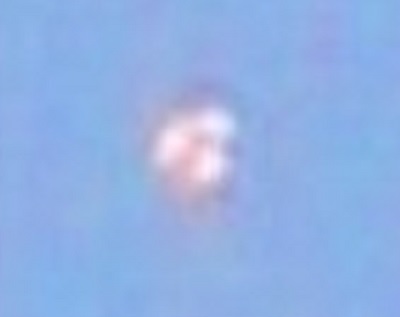It looks like you're using an Ad Blocker.
Please white-list or disable AboveTopSecret.com in your ad-blocking tool.
Thank you.
Some features of ATS will be disabled while you continue to use an ad-blocker.
share:
Why a Large Group of People (Astronomers) Rarely Report UFO sightings.
An Astronomer Looks at UFOs: A Lot Less than Meets the Eye
...there are objects in the sky that the average person may not be able to identify. This does not mean, however, that no one can identify these objects. It only means that they could appear “unidentified” to someone who is not familiar with the sky or with the full range of sky phenomena that can surprise a novice.
Indeed, upon more careful investigation, many so-called UFOs turn out to be perfectly natural objects or processes in the Earth’s atmosphere or beyond.
Bad Astronomy: Why astronomers don't report UFOs
So why don’t we see all these alien spacecraft? I think this is because we almost always understand what we’re seeing in the sky, so we know not to mistake Venus, the Moon, a satellite, or other mundane things for flying saucers.
The simple answer is because they know what they're looking at.
Astronomers, amateur and professional, number in the 10's of thousands (or more). And are looking at the skies for far longer periods of time than any other average person.
Astronomers know what balloons look like; planes; satellites; planets; stars, etc. All with the naked eye and through binoculars or telescopes. Most astronomers have a good idea where certain stars or planets are at any given moment.
As an example, here's a video titled "UFO or Planet" which actually depicts star scintillation:
There are numerous videos like this around the net (and threads posted here) labeled "UFO", but actually depicts a scintillating star. That's because there are those of us that can immediately tell what this is. But to the lay person, it's unusual. So it has to be a UFO.
Another example which has numerous videos posted all over the net (and threads here) depicting flocks of birds, but to the lay person it's a fleet of UFO's:
Not only have birds been called "fleets of UFO's", but balloons have numerous times also.
Another thread that was posted here depicted this "UFO" in the video:


For some of us, it was very easy to see that it was a small plane's lights at night:

But a select few still held the view that it was a UFO.
In this last example, a thread depicted this as an "organic entity" flying through the air:

Many of us can clearly make out the different "orbs" or balloons that make up that bundle of balloons. For comparison:


The vast majority of UFO sightings are due to misinterpreted objects like stars, planets, planes, balloons, birds, satellites, etc. To many of us, this vast majority of UFO sightings are very simple to identify as depicted in some of the examples above.
This is not to say that aliens are not or have not visited Earth. Just simply that most UFO sightings are not of alien origin.
A true UFOlogist or researcher will always attempt to rule out any terrestrial explanation first before exclaiming "ALIENS!!!".
For more information on how to identify objects in the sky before attempting to exclaim "ALIENS!!!", check out this excellent sticky thread here in the UFO forum:
Is it a star, planet, aircraft lights, satellite or.........a UFO? Find out here!
edit on 12-7-2015 by _BoneZ_ because: (no reason given)
a reply to: DEANORULES24
I don't buy that answer when it comes to astronomers. They use binoculars and telescopes. They'd easily be able to tell what any object is.
And if the object appeared to be not of this earth, the clear, close-up images taken through a telescope would be able to be scrutinized much more easily than a "dot" of light at night that can almost never be scrutinized.
I don't buy that answer when it comes to astronomers. They use binoculars and telescopes. They'd easily be able to tell what any object is.
And if the object appeared to be not of this earth, the clear, close-up images taken through a telescope would be able to be scrutinized much more easily than a "dot" of light at night that can almost never be scrutinized.
edit on 12-7-2015 by _BoneZ_ because: (no reason given)
originally posted by: DEANORULES24
a reply to: _BoneZ_
Some don't report because they are afraid to be labeled a FOOl .
The same with some pilots.
Astronomers actually do report unidentified space phenomena they just don't call them UFOs (www.uapreporting.org...).
What the OP is saying is that natural objects/occurrences are never mistaken for anything strange by astronomers, because they know very well what they are looking at.
S&F OP!
Astronomers aren't 'looking for UFOs'. The catalogue of celestial objects is vast enough and the field of view narrow enough that only if an object
swam through the lens would they get a small glimpse of it, let alone what it was. I spent a lot of time focusing through an eyepiece and only on one
occasion did I see a satellite transit the moon. It was awesome.
Otherwise…
I'm a witness of one, believe me, when you see them you will know its not earth tech. They do too many things that violate the accepted laws of physics, regardless if experienced observer or not.
Otherwise…
The vast majority of UFO sightings are due to misinterpreted objects…
I'm a witness of one, believe me, when you see them you will know its not earth tech. They do too many things that violate the accepted laws of physics, regardless if experienced observer or not.
a reply to: _BoneZ_
Maybe amateur astronomers are outdoors, professionals are in "observatories", staring at screens.
I get the 'seen most objects' and identified them; satellites, aircraft, atmospheric effects. All are well known. What I stated is when you see the other, you will know it.
Like I don't think anyone has ever seen one and gone oh, thats a plane or twinkling star, the difference is immediately obvious. Especially since 'they' seem to choose their time and place to be observed and put on some kind of show for bedazzled observers. Not just at night, either.
Maybe amateur astronomers are outdoors, professionals are in "observatories", staring at screens.
I get the 'seen most objects' and identified them; satellites, aircraft, atmospheric effects. All are well known. What I stated is when you see the other, you will know it.
Like I don't think anyone has ever seen one and gone oh, thats a plane or twinkling star, the difference is immediately obvious. Especially since 'they' seem to choose their time and place to be observed and put on some kind of show for bedazzled observers. Not just at night, either.
I just googled 'astronomer ufo' and blew the premise of your thread to pieces.
They must see all sorts of things through telescopes and binoculars on a daily basis that we would call unexplained. If they reported all of them they
wouldn't get any work done. Most are probably balloons, birds & planes. I'm sure they do report things they're not sure of because of flight paths for
planes.
People do tend to jump to the alien conclusion when they see a blob in a youtube video though. If they did see something like a UFO, do you think they would report it? Or be afraid of being labeled a fool?
People do tend to jump to the alien conclusion when they see a blob in a youtube video though. If they did see something like a UFO, do you think they would report it? Or be afraid of being labeled a fool?
edit on Sun, 12 Jul 2015 09:01:08 -0500091572015000000k by rhynouk because: (no reason
given)
Scientists probably have too many possible explanations for a limited source of data.
We've all seen digital artifacts produced by our cameras that "could" explain some sightings.
If a scientist sees a UFO it is statistically more likely to be some easily explained phenomena.
We've all seen digital artifacts produced by our cameras that "could" explain some sightings.
If a scientist sees a UFO it is statistically more likely to be some easily explained phenomena.
originally posted by: angryhulk
I just googled 'astronomer ufo' and blew the premise of your thread to pieces.
And when you did that, did you see some of the first sites that pop up like:
An Astronomer Looks at UFOs: A Lot Less than Meets the Eye
Excerpt:
...there are objects in the sky that the average person may not be able to identify. This does not mean, however, that no one can identify these objects. It only means that they could appear “unidentified” to someone who is not familiar with the sky or with the full range of sky phenomena that can surprise a novice.
Indeed, upon more careful investigation, many so-called UFOs turn out to be perfectly natural objects or processes in the Earth’s atmosphere or beyond.
Or this:
Bad Astronomy: Why astronomers don't report UFOs
Excerpt:
So why don’t we see all these alien spacecraft? I think this is because we almost always understand what we’re seeing in the sky, so we know not to mistake Venus, the Moon, a satellite, or other mundane things for flying saucers.
Some of the links I did see were to known hoaxes from claimed "astronomers". Fact is, there are very few reports of UFO's by actual astronomers.
I've updated the OP with these links as well.
edit on 12-7-2015 by _BoneZ_ because: (no reason given)
a reply to: _BoneZ_
You complete avoid the real reason which is perfectly exampled by the antics of Carl Sagan, as a grad student in college, he was adamant that UFOs were ETs and even wrote a letter to the Secretary of State at the time asking what was being done about the matter. One of his first jobs as a Ph.D. was working on the so-called Condon Committee which was an official government whitewash of the phenomena. It was there, if not earlier by his doctorate adviser, that he became aware that it was professional suicide for an astronomer to actively promote the topic of UFOs.
Today, astronomers, like airline and military pilots, are not going to jeopardize their jobs, if not careers, by reporting UFO sightings. That is the reason and for no other.
You complete avoid the real reason which is perfectly exampled by the antics of Carl Sagan, as a grad student in college, he was adamant that UFOs were ETs and even wrote a letter to the Secretary of State at the time asking what was being done about the matter. One of his first jobs as a Ph.D. was working on the so-called Condon Committee which was an official government whitewash of the phenomena. It was there, if not earlier by his doctorate adviser, that he became aware that it was professional suicide for an astronomer to actively promote the topic of UFOs.
Today, astronomers, like airline and military pilots, are not going to jeopardize their jobs, if not careers, by reporting UFO sightings. That is the reason and for no other.
originally posted by: intrptr
Astronomers aren't 'looking for UFOs'. The catalogue of celestial objects is vast enough and the field of view narrow enough that only if an object swam through the lens would they get a small glimpse of it, let alone what it was. I spent a lot of time focusing through an eyepiece and only on one occasion did I see a satellite transit the moon. It was awesome.
Otherwise…
The vast majority of UFO sightings are due to misinterpreted objects…
I'm a witness of one, believe me, when you see them you will know its not earth tech. They do too many things that violate the accepted laws of physics, regardless if experienced observer or not.
And this is the problem. So many people are just not born with a natural inclination to use scientific methods or have a natural complement of scientific tools at their intellectual disposal. To say that people will know what a ufo is when they see one is easily disprovable scientifically and is demonstrated time and time again on YouTube etc.
And your statement about satellites rarely crossing the field of view is categorically false. I see satellites, planes, birds etc crossing the field of view almost every time I have the telescope out. Its actually a common nuisance when trying to get stacking images. These days with high resolution, high speed cameras it is difficult for an experienced astronomer to misinterpret what has transited the field of view.
This may be kind of wading into a difficult profiling type area... But I think you have to consider that good quality Astronomy gear cost money.
Sure there are some cheaper ways to get into it, but prices ramp up to the high thousands very quickly.
This leads to a couple of things, generally speaking of course, but lower educated people are far less likely to be able to afford the gear. So I think they often display a glaringly obvious lack of critical thinking skills. On the flipside a well tooled up astronomer will not only have a costly education behind them but a better paying job, and the luxury to be able to spend into a hobby. So they will have a more natural ability to use the equipment properly, to learn and research and apply that knowledge in a scientifically testable way.
These type of people generally do not have jobs that allow them to just blurt out 'aliens', but will be have to be confident in their ability to make accurate predictions and be reliable, dependable and able to withstand rigorous cross testing from other professionals.
I hope I'm not offending anyone, this is general terms and I'm sure there are some buck the trend.
This leads to a couple of things, generally speaking of course, but lower educated people are far less likely to be able to afford the gear. So I think they often display a glaringly obvious lack of critical thinking skills. On the flipside a well tooled up astronomer will not only have a costly education behind them but a better paying job, and the luxury to be able to spend into a hobby. So they will have a more natural ability to use the equipment properly, to learn and research and apply that knowledge in a scientifically testable way.
These type of people generally do not have jobs that allow them to just blurt out 'aliens', but will be have to be confident in their ability to make accurate predictions and be reliable, dependable and able to withstand rigorous cross testing from other professionals.
I hope I'm not offending anyone, this is general terms and I'm sure there are some buck the trend.
edit on 12-7-2015 by Qumulys because: (no
reason given)
originally posted by: intrptr
a reply to: _BoneZ_
Maybe amateur astronomers are outdoors, professionals are in "observatories", staring at screens.
I get the 'seen most objects' and identified them; satellites, aircraft, atmospheric effects. All are well known. What I stated is when you see the other, you will know it.
Like I don't think anyone has ever seen one and gone oh, thats a plane or twinkling star, the difference is immediately obvious. Especially since 'they' seem to choose their time and place to be observed and put on some kind of show for bedazzled observers. Not just at night, either.
You generally don't become a professional astronomer and just look through telescopes. If you are that interested in the sky you've spent a lot of personal time looking up, learning and appreciating. Your statement is like saying birders only notice birds when they grab the binoculars and go out birding for the day, or football players only check out the game when they are the ones playing it.
originally posted by: Aliensun
Today, astronomers, like airline and military pilots, are not going to jeopardize their jobs, if not careers, by reporting UFO sightings. That is the reason and for no other.
Again, not buying it. There are countless anonymous outlets for astronomers (or anyone for that matter) to report UFO sightings.
In the case of an astronomer, they have the equipment to get a much closer look at an object than anyone else. If the object appeared to be something "not of this world", it's easy to get an image or video and report it anonymously somewhere without ever jeopardizing one's career.
And to this day, we don't have any clear, close-up images of a flying saucer from an astronomer, anonymous or not.
originally posted by: intrptr
Astronomers aren't 'looking for UFOs'.
I'm an amateur astronomer and I look for anything new or interesting in the sky, including possible alien craft. I have built instrumentation for professional observatories so maybe in a way that makes me a professional astronomer. I also work in the aerospace industry, hence the name. So astronomers do look for ufos and are excited to find them. They just don't call them aliens when the more likely explanation is something terrestrial.
Scientific methodology has to be developed in a person. It is not something we are born with and not something most people end up with during the regular course of their lives. I've learned that is very easy to make an assumption about what I've seen and then been easily proven wrong by someone with experience and considerably more knowledge in a subject.
edit on 12-7-2015 by CraftBuilder because: of typo.
All very good points. It's good that people have the capacity to "hold back" and not always report every little thing. I like to think I'm one of
them. But seriously, I'd love to know/get expert clarification on what an astronomer would class
"An illuminated object that appears in the 30-60,000ft region that moves from the farthest point of the Western horizon, goes overhead to the fartherst point of the Eastern horizon in 6-7 seconds flat with no apparent change to altitude"
is
adding "that this object is seen by both ground witnesses and commercial and military pilots"
(I'm one of them, on several occasions now)
I'll gladly accept an Earthly reason, but you very rarely (if ever) hear astronomers, scientists etc discuss this particular object (or ones similar that dart and zig zag about). IMO more astronomers/scientists need to research & release more in-depth public examination of "fast-walkers" and such.
"An illuminated object that appears in the 30-60,000ft region that moves from the farthest point of the Western horizon, goes overhead to the fartherst point of the Eastern horizon in 6-7 seconds flat with no apparent change to altitude"
is
adding "that this object is seen by both ground witnesses and commercial and military pilots"
(I'm one of them, on several occasions now)
I'll gladly accept an Earthly reason, but you very rarely (if ever) hear astronomers, scientists etc discuss this particular object (or ones similar that dart and zig zag about). IMO more astronomers/scientists need to research & release more in-depth public examination of "fast-walkers" and such.
edit on 12-7-2015 by markymint because: (no reason given)
originally posted by: markymint
"An illuminated object that appears in the 30-60,000ft region that moves from the farthest point of the Western horizon, goes overhead to the fartherst point of the Eastern horizon in 6-7 seconds flat with no apparent change to altitude"
Sounds like it could be the International Space Station. It can go from horizon to horizon in about 4 minutes.
Well, they are UFO's until someone classifies them as otherwise. I think too many people associated UFO's with little green men and since it's
moving and can't be identified, it must be intelligently controlled.
That bird was a UFO until I figured out is was a bird.
That bird was a UFO until I figured out is was a bird.
new topics
-
I hate dreaming
Rant: 26 minutes ago -
Is the origin for the Eye of Horus the pineal gland?
Philosophy and Metaphysics: 2 hours ago -
Man sets himself on fire outside Donald Trump trial
Mainstream News: 2 hours ago -
Biden says little kids flip him the bird all the time.
2024 Elections: 2 hours ago -
The Democrats Take Control the House - Look what happened while you were sleeping
US Political Madness: 3 hours ago -
Sheetz facing racial discrimination lawsuit for considering criminal history in hiring
Social Issues and Civil Unrest: 3 hours ago -
In an Historic First, In N Out Burger Permanently Closes a Location
Mainstream News: 5 hours ago -
MH370 Again....
Disaster Conspiracies: 5 hours ago -
Are you ready for the return of Jesus Christ? Have you been cleansed by His blood?
Religion, Faith, And Theology: 7 hours ago -
Chronological time line of open source information
History: 9 hours ago
top topics
-
In an Historic First, In N Out Burger Permanently Closes a Location
Mainstream News: 5 hours ago, 14 flags -
The Democrats Take Control the House - Look what happened while you were sleeping
US Political Madness: 3 hours ago, 10 flags -
Thousands Of Young Ukrainian Men Trying To Flee The Country To Avoid Conscription And The War
Other Current Events: 15 hours ago, 8 flags -
A man of the people
Medical Issues & Conspiracies: 10 hours ago, 8 flags -
Man sets himself on fire outside Donald Trump trial
Mainstream News: 2 hours ago, 7 flags -
Biden says little kids flip him the bird all the time.
2024 Elections: 2 hours ago, 6 flags -
4 plans of US elites to defeat Russia
New World Order: 12 hours ago, 4 flags -
Are you ready for the return of Jesus Christ? Have you been cleansed by His blood?
Religion, Faith, And Theology: 7 hours ago, 3 flags -
Is the origin for the Eye of Horus the pineal gland?
Philosophy and Metaphysics: 2 hours ago, 3 flags -
Sheetz facing racial discrimination lawsuit for considering criminal history in hiring
Social Issues and Civil Unrest: 3 hours ago, 3 flags
active topics
-
Man sets himself on fire outside Donald Trump trial
Mainstream News • 23 • : FlyersFan -
The Democrats Take Control the House - Look what happened while you were sleeping
US Political Madness • 22 • : xuenchen -
12 jurors selected in Trump criminal trial
US Political Madness • 90 • : DontTreadOnMe -
I hate dreaming
Rant • 2 • : FlyersFan -
America's Infant Mortality Rate Increases for the First Time in 20 Years
Medical Issues & Conspiracies • 22 • : BasicResearchMethods -
Post A Funny (T&C Friendly) Pic Part IV: The LOL awakens!
General Chit Chat • 7126 • : imitator -
Biden says little kids flip him the bird all the time.
2024 Elections • 10 • : imitator -
Thousands Of Young Ukrainian Men Trying To Flee The Country To Avoid Conscription And The War
Other Current Events • 28 • : Xtrozero -
Is the origin for the Eye of Horus the pineal gland?
Philosophy and Metaphysics • 4 • : JoelSnape -
Fossils in Greece Suggest Human Ancestors Evolved in Europe, Not Africa
Origins and Creationism • 72 • : Xtrozero
